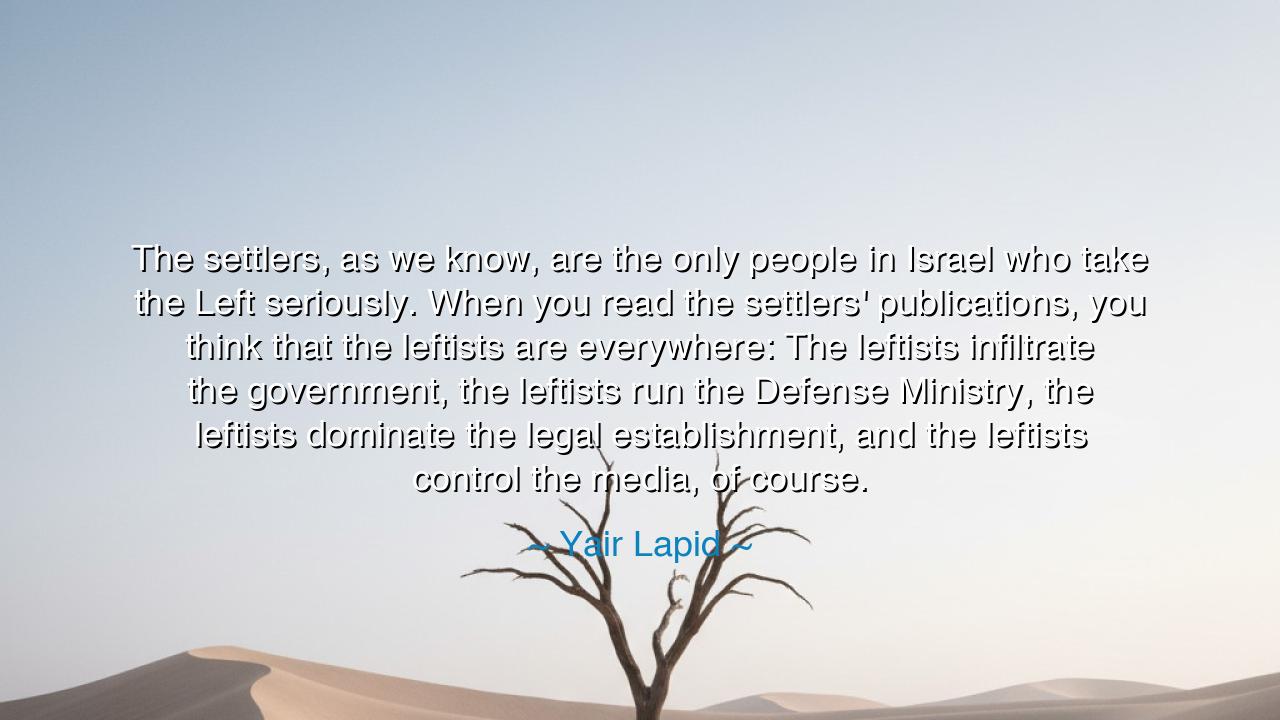
The settlers, as we know, are the only people in Israel who take
The settlers, as we know, are the only people in Israel who take the Left seriously. When you read the settlers' publications, you think that the leftists are everywhere: The leftists infiltrate the government, the leftists run the Defense Ministry, the leftists dominate the legal establishment, and the leftists control the media, of course.






The words of Yair Lapid, “The settlers, as we know, are the only people in Israel who take the Left seriously. When you read the settlers' publications, you think that the leftists are everywhere: The leftists infiltrate the government, the leftists run the Defense Ministry, the leftists dominate the legal establishment, and the leftists control the media, of course,” flow with irony, yet carry the weight of truth. Beneath their wit lies a deep reflection on the nature of fear, division, and perception — the way in which societies, divided by ideology, begin to see their opponents not as fellow citizens but as shadowy forces of control. Lapid’s observation reveals the strange alchemy of politics: that those who despise their adversaries most intensely are often the ones who attribute to them the greatest power. His words remind us that belief in opposition omnipresence is not a sign of strength, but of insecurity — for when a movement begins to see its rivals in every corner, it has already become haunted by its own doubt.
The origin of this quote lies in the enduring tension within Israeli society between settlers — those who establish and defend Jewish communities in disputed territories — and the Left, who advocate peace agreements, compromise, and the withdrawal from occupied lands. Over the decades, this divide has become more than a political disagreement; it is a spiritual chasm, cutting across families, faiths, and generations. Lapid, a centrist voice and advocate of pragmatic governance, saw within this division a mirror of a broader human truth: that when fear reigns, imagination turns one’s rivals into giants. The settlers’ perception, he notes with irony, transforms the Left into an omnipotent force — infiltrating ministries, commanding media, and steering justice — even when, in reality, the Left’s power has often waned. This exaggerated belief reveals not the strength of the Left, but the anxieties of those who feel the world shifting beneath their feet.
Throughout history, societies have fallen prey to this illusion of control by the “other.” In ancient Athens, when democracy trembled, demagogues warned that the philosophers and poets were corrupting the youth, secretly steering the city toward ruin. In Rome, the patricians accused reformers of plotting to dismantle the Republic from within. And in every age since, factions have conjured invisible networks of influence — blaming unseen hands for the chaos of change. Lapid’s words thus belong not merely to Israel, but to the universal struggle between tribes of thought: those who cling to old certainties and those who question them. When a society loses balance, its factions cease to debate and begin to imagine each other as monsters in the dark.
What makes Lapid’s insight powerful is not mockery, but lamentation. He sees how both sides, through fear, imprison themselves in echo chambers. The settlers, convinced the Left controls all, become ever more militant, while the Left, seeing itself demonized, retreats into intellectual scorn. In such a cycle, truth is lost, and only caricatures remain. Lapid’s observation, clothed in humor, hides a plea — that Israel must awaken from this dream of suspicion, lest its people tear themselves apart in pursuit of ghosts. For a nation born of survival cannot endure when it imagines enemies within every institution.
Consider the story of King Saul in the Hebrew scriptures — a man chosen to lead, yet consumed by jealousy and paranoia. He saw conspiracies everywhere, imagined betrayal in every loyal heart, and hunted the innocent David as if he were a usurper. In the end, Saul’s fear destroyed him more surely than any sword. So too, in the politics of nations, the fear of infiltration can corrode judgment and turn strength into weakness. When a people ceases to trust its own institutions — its government, its courts, its media — it no longer wages war against enemies, but against itself. Lapid’s warning is that such self-destruction begins not with violence, but with belief in illusion — the conviction that one’s rivals control everything, even destiny.
Yet, beyond critique, Lapid’s words call for wisdom and humility. He reminds us that every ideology, whether Left or Right, must learn to see its reflection in the other. The settlers’ fear of the Left mirrors the Left’s dismissal of the settlers — both sides seeing dominance where there is merely struggle, and corruption where there is merely conviction. True strength, Lapid implies, lies not in defeating one’s opponents, but in recognizing their humanity. A nation divided between shadow and light cannot survive; it must instead learn to see with both eyes — one rooted in tradition, the other open to change.
Let the lesson of Yair Lapid’s words be carried forward: beware the comfort of paranoia, for it flatters the ego while blinding the heart. When you find yourself imagining that your enemies control all things, pause — for you may be surrendering your own agency to fear. A mature society does not need to invent invisible tyrants; it needs courage to confront visible problems. And so, in our own time, as in every age, we must choose between suspicion and solidarity, between fear and faith in the common good. For only when a people dares to see its adversaries not as puppeteers but as fellow travelers in a shared destiny, will it rise beyond division and truly embody the wisdom of its prophets — that a house divided against itself cannot stand, but a nation that sees truth on both sides becomes unbreakable.






AAdministratorAdministrator
Welcome, honored guests. Please leave a comment, we will respond soon